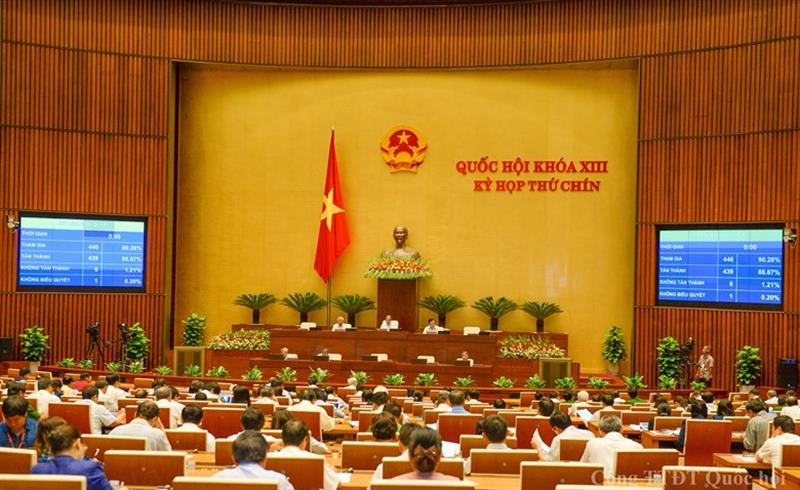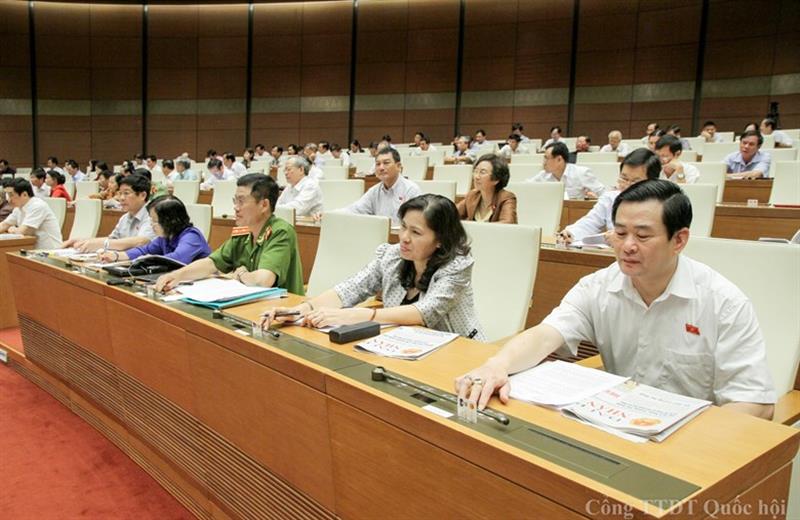New Points of the Law on Promulgation of Legal Documents 2015
Morning June 22, 2015, at the 9th Session, with 439/446 National Assembly deputies voting in favor, accounting for 88.87%, the XIII National Assembly passed the Law on Promulgation of Legal Documents. Today, July 1, the Law officially comes into effect.

Law on the Promulgation of Legal Normative Documents 2015 comprises 17 chapters, 173 Articles. It fundamentally inherits and amends, supplements, and overcomes the limitations and inadequacies of the Law on the Promulgation of Legal Normative Documents 2008 and the Law on the Promulgation of Legal Normative Documents by People's Councils and People's Committees 2004. Additionally, it unifies the promulgation of legal normative documents from central to local levels with many important new points.
Clearly Defining the Scope of Regulation of the Law
Compared to the Law on the Promulgation of Legal Normative Documents 2008 and the Law on the Promulgation of Legal Normative Documents by People's Councils and People's Committees 2004, the Law on the Promulgation of Legal Normative Documents 2015 has clearly defined the scope of regulation. The new Law stipulates principles, authority, forms, order, procedures for constructing and promulgating legal normative documents; the responsibilities of state agencies, organizations, and individuals in constructing legal normative documents; it does not stipulate the making or amending of the Constitution.
Simultaneously, there is a significant change compared to the two previous Laws on the Promulgation of Legal Normative Documents by stipulating a separate provision on the interpretation of terms. Some terms are constructed based on inheriting provisions in related legal regulations that have been practically tested, such as: Legal Norm; Subjects directly affected by legal normative documents; Interpretation of the Constitution, laws, and ordinances. Along with this, stemming from the significant theoretical and practical importance of the concept of legal normative documents, aiming to overcome limitations in distinguishing the concept of legal normative documents from ordinary administrative documents and other documents issued by state agencies recently, the new Law adds the concept of legal norm, while further perfecting the concept of legal normative documents (Articles 2 and 3).
Clearly Delineating the Authority to Promulgate Legal Normative Documents from Central to Local Levels
Based on the provisions of the 2013 Constitution and the Laws on the organization of the state apparatus, the Law on the Promulgation of Legal Normative Documents 2015 has reduced certain forms of legal normative documents, simultaneously stipulating more clearly and tightly the content of issuing forms of legal normative documents such as eliminating the form of joint circulars among Ministers, Heads of ministerial-level agencies; directives of People's Committees at all levels; only retaining the form of inter-departmental resolutions between the National Assembly Standing Committee or the Government of Vietnam with the Presidium of the Central Committee of the Vietnam Fatherland Front.
The new Law also specifically stipulates the authority and content of promulgating legal normative documents for central and local agencies, organizations, and individuals; overcoming the sprawling, unclear stipulations of previous Laws; clearly delineating the authority to promulgate legal normative documents of provincial, district, commune authorities, and special administrative-economic units (from Articles 15 to 30).
Enhancing Responsibility and Innovating the Process of Constructing and Promulgating Legal Normative Documents
Overcoming the limitations of the previous 2 Laws on the Promulgation of Legal Normative Documents, the Law on the Promulgation of Legal Normative Documents 2015 separately stipulates an Article on the responsibility of agencies, organizations, and competent persons in constructing and promulgating legal normative documents (Article 7) according to 3 groups of subjects: Group of agencies, organizations, and competent persons proposing, drafting projects for legal normative documents; Group of agencies appraising, verifying; agencies participating in giving opinions and Group of agencies promulgating legal normative documents. Additionally, in Clause 8, Article 7 of the Law on the Promulgation of Legal Normative Documents 2015 also clearly stipulates the responsibility of individuals in constructing and promulgating legal normative documents.
The Law of 2015 also fundamentally innovates the process of constructing and promulgating legal normative documents towards separating the process of policy formulation from the drafting process of laws, ordinances, decrees, and resolutions of provincial People's Councils, focusing on stipulating the process of policy formulation towards having policies approved before starting the draft; amending some provisions in the drafting, appraisal, verification, review, and approval process of legal normative documents and innovating the process of constructing and promulgating legal documents of some other subjects.
Specifically, the Law on the Promulgation of Legal Normative Documents 2015 adds the policy formulation process; amends some provisions in the drafting, appraisal, verification, review, and approval process of legal normative documents; innovates the process of constructing and promulgating legal documents of some other subjects...
Besides, the Law on the Promulgation of Legal Normative Documents 2015 does not stipulate the Program for constructing laws and ordinances by the National Assembly term but only stipulates the Annual Program for constructing laws and ordinances. This aims to overcome the limitations and inadequacies of the 2008 Law because the stipulation of the Program for constructing laws and ordinances by the National Assembly term (5 years) is too long, difficult to be practicable since this Program often needs to be adjusted to suit the rapidly developing socio-economic conditions of the country. Therefore, the construction and promulgation of the Program for constructing laws and ordinances for the entire National Assembly term is not necessary.

Enhancing Transparency and Specifically Stipulating Prohibited Acts
The Law on the Promulgation of Legal Normative Documents 2015 has supplemented many provisions to enhance transparency in constructing and promulgating legal normative documents, such as stipulating the participation in giving opinions on constructing legal normative documents (Article 6); requiring drafting agencies to explain the incorporation of opinions; publishing legal normative documents in the Official Gazette (Article 150); posting and reporting legal normative documents (Article 157)...
The Law on the Promulgation of Legal Normative Documents 2015 specifically stipulates prohibited acts, thereby contributing to enhancing efficiency and feasibility in constructing and promulgating legal normative documents. In Article 4, the Law prohibits the issuance of legal normative documents contrary to the Constitution, contrary to the legal normative documents of superior state agencies; Issuing documents not belonging to the system of legal normative documents but containing legal norms; Issuing legal normative documents not in accordance with authority, forms, procedures as stipulated. Simultaneously, it prohibits legal normative documents by the Chief Justice of the Supreme People's Court, the Head of the Supreme People's Procuracy; Ministers, Heads of ministerial-level agencies; the State Auditor General; People's Councils, People's Committees at all levels from stipulating administrative procedures, except where authorized by law to ensure better fundamental rights and obligations of citizens in the new spirit of the 2013 Constitution.
Adding Cases for Shortened Procedures in Constructing and Promulgating Legal Normative Documents
To overcome previous limitations and inadequacies, the Law on the Promulgation of Legal Normative Documents 2015 has removed some provisions of the 2008 Law on the Promulgation of Legal Normative Documents, simultaneously adding some cases such as: Emergency cases as stipulated by law on emergency states; sudden, urgent cases in preventing and combating natural disasters, epidemics, fires, explosions; Urgent cases to resolve arising issues in practice according to decisions of the National Assembly; Cases to suspend the whole or part of a legal normative document for a certain period; Cases needing immediate amendments to conform to newly issued legal normative documents (Article 146).
Adding Many Conditions to Ensure Resources for Constructing and Promulgating Legal Normative Documents
If the Law on the Promulgation of Legal Normative Documents 2008 and the Law on the Promulgation of Legal Normative Documents by People's Councils and People's Committees 2004 only had provisions on funding for constructing legal normative documents, the Law on the Promulgation of Legal Normative Documents 2015 has added numerous conditions to ensure resources for constructing and promulgating legal normative documents such as: The State has policies to attract, train, foster, and arrange officials participating in constructing and promulgating legal normative documents suitable to the requirements and tasks stipulated in this Law; modernizing means, technical infrastructure; ensuring funding for activities of policy formulation, drafting, appraisal, verification, revision, perfection, and promulgation of legal normative documents (Article 171).
Thus, after officially taking effect, the Law on the Promulgation of Legal Normative Documents 2015 will contribute to overcoming the limitations and inadequacies of previous law-making and promulgating activities, while being an important legal foundation to perfect our country's legal system in the coming time.
Source: quochoi.vn
- Cases of land rent exemption and reduction under the latest regulations in Vietnam
- Economic infrastructure and social infrastructure system in Thu Duc City, Ho Chi Minh City
- Regulations on ordination with foreign elements in religious organizations in Vietnam
- Increase land compensation prices in Vietnam from January 1, 2026
- Determination of land compensation levels for damage during land requisition process in Vietnam
- Who is permitted to purchase social housing according to latest regulations in Vietnam?
-

- Notable new policies of Vietnam effective as of ...
- 16:26, 11/04/2025
-
.Medium.png)
- Notable documents of Vietnam in the previous week ...
- 16:21, 11/04/2025
-
.Medium.png)
- Notable documents of Vietnam in the previous week ...
- 16:11, 02/04/2025
-
.Medium.png)
- Notable new policies of Vietnam to be effective ...
- 16:04, 02/04/2025
-
.Medium.png)
- Notable new policies of Vietnam effective from ...
- 14:51, 21/03/2025
 Article table of contents
Article table of contents
